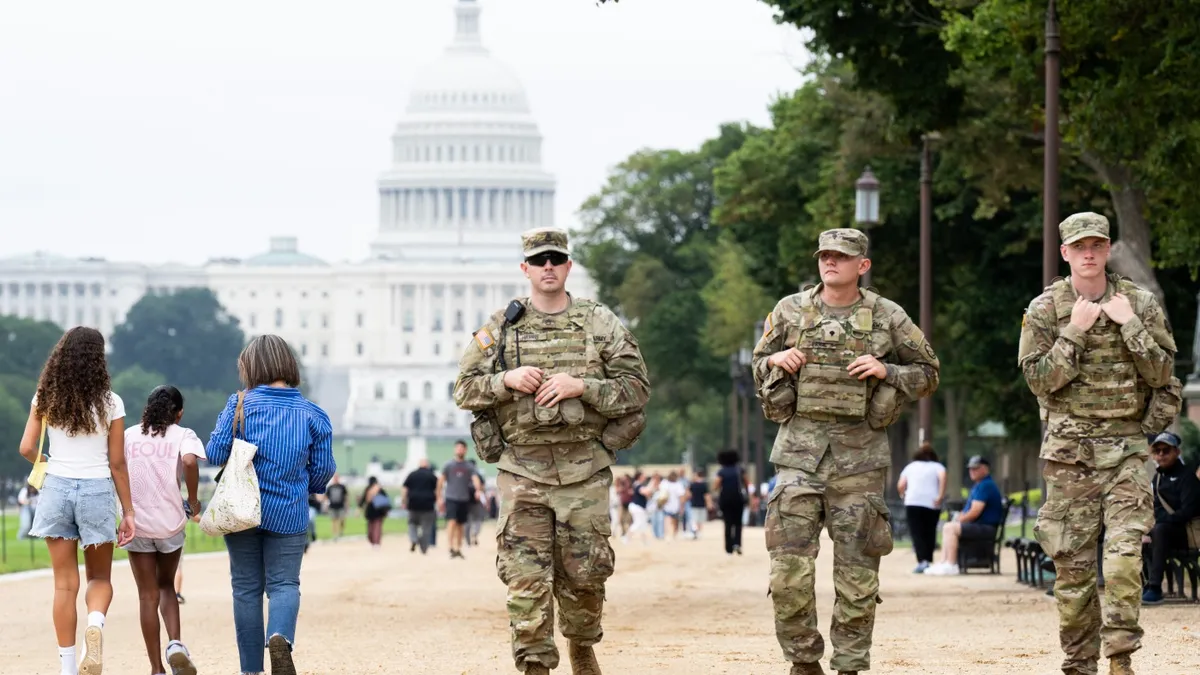
President Trump's recent decision to assert federal control over Washington, D.C.'s police force and deploy National Guard troops to patrol the capital represents a significant shift from established governing norms, according to experts. This unprecedented move has resulted in hundreds of National Guard troops establishing a presence on the streets of the nation's capital, with even more expected to arrive in the coming days.
The National Guard is a unique military branch that operates under both state and federal authorities. While typically, National Guard troops answer to the governors of their respective states, the President has the authority to activate a state's National Guard without requiring the governor's approval. Notably, since Washington, D.C. lacks statehood, its National Guard is directly accountable to the President.
National Guard troops are often deployed during crises, such as catastrophic weather events, civil unrest, and public health emergencies, including the fallout from the coronavirus pandemic. For instance, during the 2020 racial justice protests following the murder of George Floyd, many states called upon their National Guards to assist local law enforcement. In D.C., Trump ordered over 5,000 troops to monitor the largely peaceful protests. However, his recent decision to federalize the National Guard in response to crime in D.C.—which he has characterized as rampant, despite a significant decline in crime rates—marks a departure from the National Guard's intended mission.
Throughout American history, it has been common for governors or the President to mobilize the National Guard during times of turmoil. However, the nation's founders were initially cautious about military intervention in domestic affairs. Joseph Nunn, an attorney at the Brennan Center's Liberty and National Security Program, notes that the founders' experiences with military force, such as the Boston Massacre and the quartering of troops in civilian homes, led to significant skepticism about military power.
At the Constitutional Convention, there were intense debates regarding the establishment of a national standing army versus relying solely on state militias. Ultimately, the Founding Fathers concluded that state militias should be available for domestic deployment only in emergencies, setting the precedent for what would evolve into the National Guard.
From the era of George Washington, who led a contingent of state militias to suppress the Whiskey Rebellion, to President Abraham Lincoln's mobilization of state militias during the Civil War, there is a long history of presidents calling upon state military forces for federal needs. However, in more recent times, presidents have typically deferred to governors when evaluating the necessity of National Guard involvement.
During the Civil Rights Movement, presidents occasionally superseded state authority to activate the National Guard, such as when President Dwight Eisenhower intervened in 1957 to assist with the integration of schools in Arkansas. More recently, Trump's actions in June of this year, where he federalized thousands of California National Guard troops in response to protests against immigration raids, broke a longstanding tradition of respecting state authority. Nunn states that such an unprecedented intervention in modern American history hasn't been seen since the Pullman strike in 1894.
Trump's decision to federalize the National Guard in D.C., despite opposition from local leadership, showcases a significant departure from established political norms. Experts warn that this militarization of civilian law enforcement could lead to serious implications for the relationship between military personnel and the community they serve. Mark Cancian, a retired Marine Corps colonel, emphasizes that the military is not adequately trained for wide-scale law enforcement, which can create discord in interactions with civilians.
While the National Guard is intended to support police in maintaining order, as outlined in the Posse Comitatus Act, which seeks to limit military intervention in civilian matters, recent developments indicate a shift. Reports suggest that National Guard troops in D.C. may soon be armed, raising concerns about potential escalations in confrontations with civilians. Cancian expresses alarm over this possibility, noting that police are trained extensively in the appropriate use of force, while the military's perspective on civilians differs significantly.
The military often views civilians as potential threats rather than individuals who may simply be misbehaving. This mindset can lead to tragic outcomes, as evidenced by the Kent State shootings in 1970, where National Guardsmen fired into a crowd of protesting students, resulting in casualties. The contrast in how law enforcement and military personnel perceive and interact with civilians underscores the risks associated with deploying the National Guard for civilian law enforcement duties.
In summary, President Trump's assertion of federal control over D.C.'s police force and the deployment of National Guard troops signifies a profound shift in the traditional role of the military within civilian law enforcement. As experts continue to analyze the implications of this decision, the normalization of military involvement in routine law enforcement raises important questions about the future of governance and public safety in the United States.